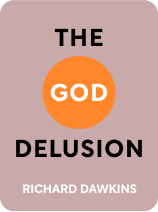

This article is an excerpt from the Shortform book guide to "The God Delusion" by Richard Dawkins. Shortform has the world's best summaries and analyses of books you should be reading.
Like this article? Sign up for a free trial here .
What is Darwinian morality? How can evolution help explain things like morals, kindness, and love?
Darwinian morality is the idea that kindness and love are a part of our evolutionary process. Altruism would have been a beneficial quality in early humans, ones they would’ve wanted to pass down to offspring.
Read more about Darwinian morality below.
God and Morality
So far, we’ve talked mostly about why the claims put forward by religion are unlikely to be true, and why religion’s existence and persistence can be explained through rational processes of evolutionary psychology and cultural transmission. But even if the claims made by religion are unsubstantiated and its origins have nothing to do with the revelation of divine truth, doesn’t it still serve a valuable purpose as the foundation for morality? Would we be capable of kindness and empathy without God?
In this article, we’ll make the case that morality and religion are wholly separate, including Darwinian morality.
- How altruism and kindness are fully compatible with Darwinian natural selection
- How there is no documented difference in moral intuition between atheists and people of faith
- How adherence to moral standards solely out of fear of divine punishment is a poor basis for morality
- How religious texts like the Bible promote abhorrent values that are totally at odds with modern morality
Darwinian Morality
Religious people claim that Darwinism cannot account for the existence of altruism, kindness, or empathy. They argue that the theory of natural selection threatens to undermine the very foundations of human morality. Darwinism, they claim, is purely about the survival of the fittest, and an organism concerned solely with its own survival cannot care about the health and wellbeing of others. They see the fact that humans do feel empathy and compassion as a glaring contradiction that Darwinism can’t explain.
But this view is based on a misunderstanding and gross caricature of Darwinist principles. Darwinism does not postulate a selfish “kill or be killed, eat or be eaten” view of human history. In fact, kindness and altruism have perfectly rational Darwinian roots. This is where Darwinian morality comes in.
Darwinism and Modern Morality
As we mentioned, early kin-based human communities would have strongly favored genetic tendencies toward altruism on the basis of both kin survival and reciprocity. We are thus bred to be altruistic and moral.
It’s important to note that this does not make the love and compassion we feel toward our fellow human beings any less real or genuine. It simply provides a coherent explanation for why we think and behave as we do. Understanding Darwinism intellectually does not make anyone love their family and friends less, despite what creationists might claim. Darwinian morality is very real.
Indeed, our modern displays of love and affection might simply be misfirings of our normal evolutionary impulses, just as we saw with religion itself in the previous chapter. For example, the desire for sex comes from a clear Darwinian impulse—to create offspring to pass along your genes. But we still experience lust and desire when there is no chance of procreation—as in same-sex relationships or when a heterosexual couple is using birth control. Sexual desire still exists independently of the original evolutionary impulses that explain it. This is all part of Darwinian morality.

———End of Preview———
Like what you just read? Read the rest of the world's best book summary and analysis of Richard Dawkins's "The God Delusion" at Shortform .
Here's what you'll find in our full The God Delusion summary :
- Why Dawkins thinks religion has exerted a harmful influence on human society
- How Dawkins concludes that the existence of God is unlikely
- The 3 arguments that challenge the existence of God






